前景实用英语(二)-unit6教案
新未来大学英语 综合教程2教学课件Unit 6 Objectives+warming up
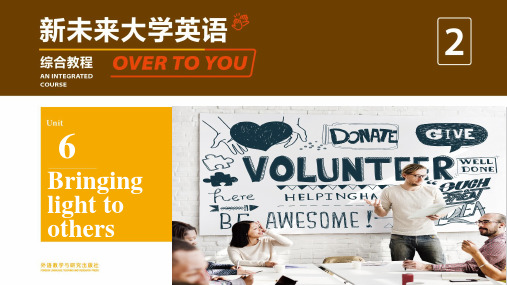
Warming up
3) Some of these benefits might help younger volunteers _i_n_c_re_a_s_e_t_h_e_ir_e_m__p_lo_y_a_b_i_li_t_y due to the skills they gain or help older volunteers with their physical health and deal with life changes. 4) Volunteering can also help anyone _st_r_u_g_g_li_n_g_w__it_h_p_e_r_s_o_n_a_l _d_if_f_ic_u_l_ti_e_s_ , such as mental health challenges to face them better.
Objectives
Section 2
Text A WWF: Help us to help the world • to take notes while reading • to make decisions by weighing pros and cons • to write a letter recommending a voluunteering in Nepal • to analyze the influence of volunteering on individuals
1) Health and _w_e_l_l-_b_e_in_g_ are some of the well-known benefits of volunteering. This comes about through personal achievements, physical activities and _a_s_e_n_s_e_o_f_p_u_r_p_o_s_e. 2) Another benefit is personal growth. Through learning skills and in the process gaining confidence, you can even improve your _s_o_c_i_al_l_i_fe_ . volunteering helps you _m__a_k_e_n_e_w__f_ri_e_n_d_s_h_ip_s_ and social contacts, and gives you a greater appreciation of others’ values and your own.
新编实用英语综合教程2unit6shoppingandsightseeing教案

Unit 6 Shopping and Sightseeing Unit GoalsWhat you should learn to do1.Ask about the price2.Ask about style, size, and color of clothing3.Ask about the model, use and guarantee of appliances4.Talk about shopping5.Ask for a discount6.Understand and talk about shopping and travel ads7.Read and ask about operating instructionsWhat you should know about1.Shopping2.Tourist attractions3.Present participate and past participate as attributives Section I Talking Face to Face1.Imitating Mini-Talks2.Acting out the Tasks3.Studying Email Information on the Internet4.Following Sample Dialogues5.Putting Language to UseSection II Being All Ears1.Learning Sentences for Workplace Communication2.Handling a Dialogue3.Understanding a Short Speech / TalkSection III Trying your Hand1.Practicing Applied Writing2.Writing Sentences and Reviewing GrammarSection IV Maintaining a Sharp EyePassage 1 :Information Related to the Reading PassageFrom the first World Expo held in London in 1851, the World Expos have been held successively for many years. In 1933, World Expo Chicago set up its theme, and then the following expos also had their special themes.Text How I “Survived”the Shanghai ExpoAn Overseas Visitor’s Personal ExperienceMy aunt in Vancouver shared a wise Chinese saying after she came back from her trip to the Shanghai Expo:“If you didn’t go to the Shanghai Expo, you would regret it. If you did go to the Shanghai Expo, you would regret it even more.”I laughed. However, there was a lot of truth to the statement. For the price of an admission ticket to the Expo, you could get to witness a great human accomplishment: Over 200 architecturally cutting-edge national pavilions in a 4-km2 exhibition site. At the same time, you could get to witness and experience the exhausting 4 or 5 hours’long queuing lines.Believe me: the Expo itself would wear you out after Day One. In addition, you shouldn’t have come just to visit Shanghai for the Expo. Shanghai was a dynamic, modern, international city —the “city of the future”—and it is really worth breaking up your Expo visit with trips to the Bund, to Nanjing Road, to ultra-modern Pudong, maybe even to the neighboring cities: Hangzhou and Suzhou. And if you’d been to Shanghai many times already and seen all these sights, then you could use the rest of your time to do the one thing Shanghai was best known for: shopping, shopping, shopping.How I Chose The Best Pavilions to See“What were the best pavilions to see?”This was a good question. With over 200 pavilions and such limited time and such long lines, you wouldn’t want your day at the Expo site to go to waste.Actually, answering this question would start with yourself. If you’d been to France, there was no point waiting an hour to see the Fisher Price version of France in the French Pavilion (although still quite beautiful).The Real Stars I enjoyed most: mid-sized Countries pavilionsYou might be very much exhausted by queuing before the heavy hitters of the Expo —the China pavilion and the big “brand-name”countries —but you willalso discover that there are some real gems —mid-sized countries’pavilions.Mid-sized countries pavilions had short lines (10-30 minutes at most) and their displays could be quite beautiful and informative! Two that I enjoyed were: Indonesia and New Zealand. Indonesia had a long, snaking exhibit that showcased everything from coral reefs to ruins of culture. New Zealand, while short on the actual interior display, had a roof garden with everything from stuffed animals to Kiwi trees and herbs. Some countries were too small or poor to afford their own stand-alone pavilion. In that case, they rented space in a pavilion warehouse, usually grouped by region or continent. The Africa pavilion reminded me of a college activities fair, with booths and stands for individual countries. These places are also great if you were looking to learn more about a lot of countries in a short amount of time.Simply stated, the Shanghai Expo was a once-in-a-lifetime experience. Maybe it’s because, after visiting the Expo, you would probably tell yourself that you never want to do this again. But once you get to recall this rare Shanghai Expo experience sometime in the future, you will probably be happy that you had the chance to partake in such a world-class event and such an unusual experience.Language Points1 Explanation of Difficult Sentences1. (Para. 3) Shanghai is a dynamic, modern, international city —the “city of the future”—and it is really worth breaking up your Expo visit with trips to the Bund, to Nanjing East Road, to ultra-modern Pudong, maybe even to neighboring Hangzhou and Suzhou.Analysis: This is a long compound sentence, with several parallel phrases to …, to …, to …, even to …as attributives modifying the word trips.It is really worth breaking up your Expo visit means there is a good enough reason for visiting some other places except the Shanghai Expo. Translation: 上海是个充满活力的现代化的国际城市——“未来之城”,因此的确值得把你参观世博会的时间分一点去游览一下外滩、南京东路、超现代化的浦东,甚至临近的杭州和苏州。
2019外研版高中英语选择性必修二Unit6 Understanding ideas 教学设计
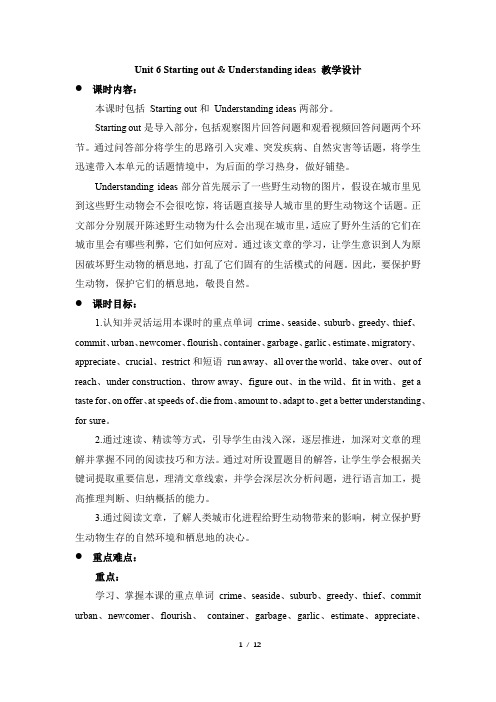
Unit 6 Starting out & Understanding ideas 教学设计●课时内容:本课时包括Starting out和Understanding ideas两部分。
Starting out是导入部分,包括观察图片回答问题和观看视频回答问题两个环节。
通过问答部分将学生的思路引入灾难、突发疾病、自然灾害等话题,将学生迅速带入本单元的话题情境中,为后面的学习热身,做好铺垫。
Understanding ideas部分首先展示了一些野生动物的图片,假设在城市里见到这些野生动物会不会很吃惊,将话题直接导人城市里的野生动物这个话题。
正文部分分别展开陈述野生动物为什么会出现在城市里,适应了野外生活的它们在城市里会有哪些利弊,它们如何应对。
通过该文章的学习,让学生意识到人为原因破坏野生动物的栖息地,打乱了它们固有的生活模式的问题。
因此,要保护野生动物,保护它们的栖息地,敬畏自然。
●课时目标:1.认知并灵活运用本课时的重点单词crime、seaside、suburb、greedy、thief、commit、urban、newcomer、flourish、container、garbage、garlic、estimate、migratory、appreciate、crucial、restrict和短语run away、all over the world、take over、out of reach、under construction、throw away、figure out、in the wild、fit in with、get a taste for、on offer、at speeds of、die from、amount to、adapt to、get a better understanding、for sure。
2.通过速读、精读等方式,引导学生由浅入深,逐层推进,加深对文章的理解并掌握不同的阅读技巧和方法。
中职英语基础模块2(新课标版)教案:unit6tellmewhenthepainstarted

Unit 6 T ell me when the pain started.(第一课时教学设计)一、学情分析本单元是教材《英语2》(基础模块高教版)第六单元,主要话题为看病就医。
教师可通过本单元的听、说、读、写各种教学活动,一方面帮助学生掌握正确表达与英语学习相关的词汇与句型,另一方面引导学生结合自身的情况反思自己的英语学习,针对自身的学习问题选择有效的学习策略。
二、教材分析1. 教学内容具体内容为:有关常见疾病的名称和描述病情的句式、就医时医生和病人之间的有关的对话。
2. 教学重点、难点⑴教学重点能够听懂就医的常用语,掌握叙述病症、接受医生建议的常用表达方式。
⑵教学难点有关就医的词汇和句型。
三、教学目标1.知识目标(1)帮助学生掌握以下词汇:stomachache, toothache, fever, cough, headache, back pain, runny nose, sore throat, appointment等。
(2)帮助学生掌握就医时使用的基本句型,如:What’s wrong with you?I’ve a headache / a sore throat / a runny nose / fever / cough, ect.How long have you felt this way?I feel cold. I think I have a fever.I’d like to make an appointment with the doctor.The doctor is free at ….Will … be OK for you?Take this medicine … times a day. / Stay in bed for …. / Y ou should have a good rest.Thank you very much.四、教学步骤Step One Lead-in (7 mins)1. The teacher greets the Ss with the following sentences:How are you, boys and girls?I didn’t sleep well last night.I’ve had a cold because ….I’m not myself today.Explain I’m not myself today and get the Ss to say something about themselves. Step T wo Listening and speaking (30 mins)1. Before listening, ask the Ss to look at the picture and answer the question: What’s wrong with the boy in the picture?2. Activity 3: Listen and answer the questions.Listen to the tape and answer the questions. Listen again and then check the answers.3. Activity 4: Listen again and complete the card.4. Activity 5: Read and underline.Read aloud after the tape and then practice the dialogue in pairs. Get some pairs to act it out.Underline the sentences about illness and check in class.Step Three Summary (6 mins)Make a short summary of what we’ve learned today.(1) Useful expressions: have a stomachache / toothache / fever / cough / headache / back pain / runny nose / sore throat, make an appointment, etc.(2) Everyday English:What’s wrong with you?I’ve a headache / a sore throat / a runny nose / fever / cough, ect.How long have you felt this way?I feel cold. I think I have a fever.I’d like to make an appointment with the doctor.The doctor is free at ….Will … be OK for you?Take this medicine … times a day. / Stay in bed for …. / Y ou should have a good rest.Step Four Homework (2 mins)1. Practice the dialogue in pairs and recite it..2. Make up a dialogue with your partner.五、板书设计Unit 6 T ell me when the pain started.(第二课时教学设计)一、教材分析1. 教学内容具体内容为:阅读有关描述病人病情的小短文,填写病人病历,并根据病情编写医生和病人之间的对话;撰写英文病假条。
前景实用英语教案
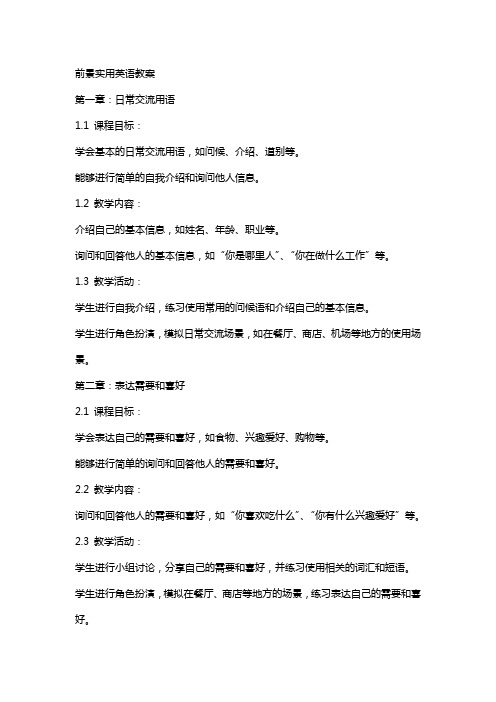
前景实用英语教案第一章:日常交流用语1.1 课程目标:学会基本的日常交流用语,如问候、介绍、道别等。
能够进行简单的自我介绍和询问他人信息。
1.2 教学内容:介绍自己的基本信息,如姓名、年龄、职业等。
询问和回答他人的基本信息,如“你是哪里人”、“你在做什么工作”等。
1.3 教学活动:学生进行自我介绍,练习使用常用的问候语和介绍自己的基本信息。
学生进行角色扮演,模拟日常交流场景,如在餐厅、商店、机场等地方的使用场景。
第二章:表达需要和喜好2.1 课程目标:学会表达自己的需要和喜好,如食物、兴趣爱好、购物等。
能够进行简单的询问和回答他人的需要和喜好。
2.2 教学内容:询问和回答他人的需要和喜好,如“你喜欢吃什么”、“你有什么兴趣爱好”等。
2.3 教学活动:学生进行小组讨论,分享自己的需要和喜好,并练习使用相关的词汇和短语。
学生进行角色扮演,模拟在餐厅、商店等地方的场景,练习表达自己的需要和喜好。
第三章:询问方向和地点3.1 课程目标:学会询问方向和地点,如问路、找到某个地方等。
能够准确地表达自己的位置和方向。
3.2 教学内容:常用的询问方向和地点的词汇和短语,如“请问在哪里”、“怎么走”等。
表达自己的位置和方向,如“我在超市的旁边”、“你往前走,左转”等。
3.3 教学活动:学生进行角色扮演,模拟在街头问路的情景,练习使用相关的词汇和短语。
学生进行小组活动,制作简单的地图,练习表达自己的位置和方向。
第四章:描述人和事物4.1 课程目标:学会描述人和事物的特征和属性,如外貌、性格、喜好等。
能够准确地表达自己的观察和看法。
4.2 教学内容:常用的描述人和事物的词汇和短语,如“高个子”、“善良的”、“喜欢音乐”等。
表达自己的观察和看法,如“我觉得他很聪明”、“她看起来很累”等。
4.3 教学活动:学生进行小组讨论,描述自己或他人的外貌和性格特点,并练习使用相关的词汇和短语。
学生进行角色扮演,模拟在面试或相亲等场合描述自己和对方的特征和属性。
高中英语必修第二册教案Unit 6 The Admirable Lesson 1 A Medical Pioneer-北师大版(2019)
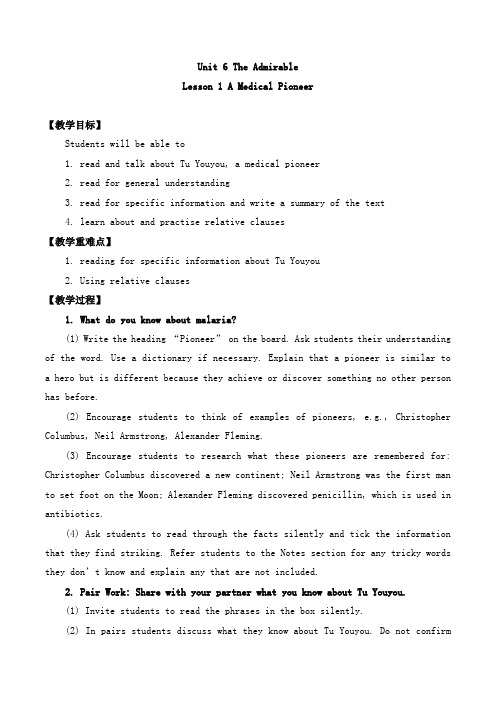
Unit 6 The AdmirableLesson 1 A Medical Pioneer【教学目标】Students will be able to1. read and talk about Tu Youyou, a medical pioneer2. read for general understanding3. read for specific information and write a summary of the text4. learn about and practise relative clauses【教学重难点】1. reading for specific information about Tu Youyou2. Using relative clauses【教学过程】1. What do you know about malaria?(1) Write the heading “Pioneer” on the board. Ask students their understanding of the word. Use a dictionary if necessary. Explain that a pioneer is similar to a hero but is different because they achieve or discover something no other person has before.(2) Encourage students to think of examples of pioneers, e.g., Christopher Columbus, Neil Armstrong, Alexander Fleming.(3) Encourage students to research what these pioneers are remembered for: Christopher Columbus discovered a new continent; Neil Armstrong was the first man to set foot on the Moon; Alexander Fleming discovered penicillin, which is used in antibiotics.(4) Ask students to read through the facts silently and tick the information that they find striking. Refer students to the Notes section for any tricky words they don’t know and explain any that are not included.2. Pair Work: Share with your partner what you know about Tu Youyou.(1) Invite students to read the phrases in the box silently.(2) In pairs students discuss what they know about Tu Youyou. Do not confirmideas at this point.(3) Invite pairs to come to the front of the class and share what information they know about Tu Youyou. Gather any interesting details and write them on the board.3. What do you expect to read in a news article about Tu Youyou?(1) Tell students that they will be reading a news article about Tu Youyou. Draw students’ attention to the photo on page 52 and ask them what they think is happening in the picture, i.e., Tu Youyou is at the Nobel Prize Lecture receiving the prize.(2) Students write at least three questions they would like to ask about Tu Youyou.4. Read and find out.(1) Tell students that they will be reading a news article on a pioneer.(2) Allow students time to read the full article or call on volunteers to read the passage aloud.(3) Encourage students to try to use context to understand unknown terms.(4) If needed, instruct students to draw a ruler line under each paragraph. Then provide a general sentence for each paragraph that acts as a summary. This will help the students to sort out the new information.(5) Ask students if their questions were answered in the news article.(6) If there is time, make a list of any unanswered questions and search for answers on the Internet or assign students to find the answers at home.5. Read, complete and introduce.(1) Tell students to read the news article in more detail, they should take their time to go through the text carefully.(2) Draw students’ attention to the mind map on page 54 and have students read the topics they need to find details about in the news article. Clarify any unknown words before students start reading.(3) Encourage students to underline the parts of the text that contain the information.(4) Help any struggling students by giving them the paragraph number where each piece of information is located.(5) Once students have completed their notes, have them share their answers with a partner or with the class.6. Match and talk about Tu Youyou’s work and achievement.(1) Divide students into groups based on their understanding level. Allow high level students to complete the exercise independently. Encourage middle level students to work together to read the rubric and words in the columns. Then complete the activity. Support low level students by listening as they read the words in the columns aloud and explain unknown terms. Then help low level students to match the columns.(2) Encourage students to use their dictionaries for understanding.7. Group Work: Summarise Tu Youyou’s personal quality.(1) Remind students about qualities of admirable people.(2) In small groups students discuss Tu Youyou’s personal qualities. Encourage students to provide reasons for their answers.(3) Assign one representative to share their group’s answers with the class.8. Group Work: Think and share.(1) In small groups students discuss the questions. Encourage students to provide reasons for their answers.a. Why is Tu Youyou considered a medical pioneer?b. What typical writing features can you identify in the news article about Tu Youyou?(2) Assign one representative to share the group’s answers with the class.9. Identify relative clauses.(1) Explain to students that a relative clause is a part of a sentence that has a verb in it and is joined to the rest of the sentence by words such as “who”, “which”, “where”, “when”.(2) Instruct students to work in pairs to read aloud the sentences and to point out the verbs which indicate the relative clauses.(3) If needed, have students look at the Grammar Summary, Unit 6, Relative Clauses on page 92. Read through the rules and examples with the class and ensure that students understand relative clauses in the examples.(4) Students can independently tick the sentences that include a relative clause.10. Which words are used to join the sentences together?In pairs students read the sentences and circle words that link sentences or clauses together. Ask students if they notice common words and summarise how they are used.11. Join the pairs of sentences using relative pronouns.(1) Explain to students that a relative pronoun is used to connect a clause or phrase to a noun or pronoun. The clause modifies or describes the noun. The most common relative pronouns are who, whom, whose, which, and that.(2) Instruct students to work in pairs to read aloud the sentences and to join the two sentences with relative pronouns.(3) If needed, have students look at the Grammar Summary, Unit 6, Relative Clauses on page 92. Read through the rules and examples with the class and ensure that students understand relative pronouns in the examples.(4) Students can independently write and join the sentences using relative pronouns.12. Express yourself.(1) Instruct students to write three sentences on the admirable qualities of Tu Youyou using relative clauses. Their sentences need to be persuasive for a committee to include Tu Youyou as a role model.(2) Students read their sentences to the class.(3) Put two groups of students together and have one of them be the committee. The other group should present their arguments in order to persuade the committee. Find out whether this is the case or not. Then have groups change roles.。
前景实用英语综合教程2

前景实用英语综合教程2前景实用英语综合教程Practical English Comprehensive Course前言:Introduction《前景实用英语综合教程》是一本针对初学者设计的英语教材,旨在帮助学生提高英语听说读写能力。
本教程主要分为听力、口语、阅读和写作四个部分,通过多种练习形式,如对话、听力理解、口语表达、阅读理解和写作练习等,让学生全面掌握实用英语的基本技能。
<Preface> "Practical English Comprehensive Course" is anEnglish textbook designed for beginners, aiming to help students improve their English listening, speaking, reading, and writing skills. This tutorial is mainly divided into four parts: listening, speaking, reading, and writing. Through various exercises such as dialogues, listening comprehension, oral expression, reading comprehension, and writing exercises, students can comprehensively master the basic skills of practical English.第一部分:听力Part 1: Listening听力是语言学习的基础,也是交流的基本技能之一。
通过听力练习,学生能够提高对于英语语音、语调和语速的理解能力,提升听力水平。
本部分主要包括日常对话、新闻、访谈等各种题材的听力材料,学生通过听力理解题考察对于听力材料的理解和把握能力。
前景实用英语综合教程2unit6
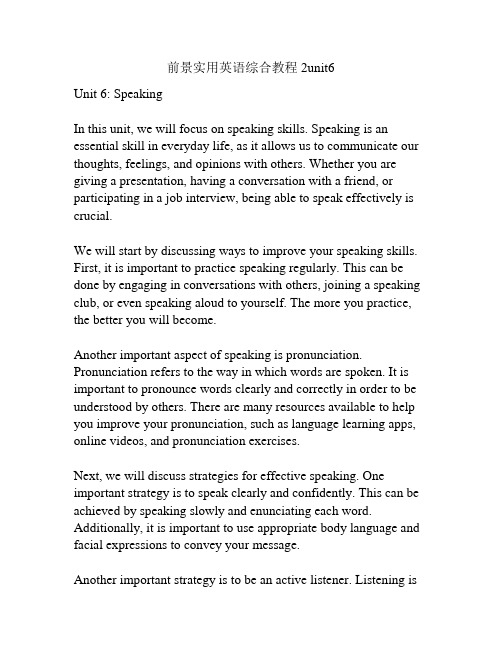
前景实用英语综合教程2unit6Unit 6: SpeakingIn this unit, we will focus on speaking skills. Speaking is an essential skill in everyday life, as it allows us to communicate our thoughts, feelings, and opinions with others. Whether you are giving a presentation, having a conversation with a friend, or participating in a job interview, being able to speak effectively is crucial.We will start by discussing ways to improve your speaking skills. First, it is important to practice speaking regularly. This can be done by engaging in conversations with others, joining a speaking club, or even speaking aloud to yourself. The more you practice, the better you will become.Another important aspect of speaking is pronunciation. Pronunciation refers to the way in which words are spoken. It is important to pronounce words clearly and correctly in order to be understood by others. There are many resources available to help you improve your pronunciation, such as language learning apps, online videos, and pronunciation exercises.Next, we will discuss strategies for effective speaking. One important strategy is to speak clearly and confidently. This can be achieved by speaking slowly and enunciating each word. Additionally, it is important to use appropriate body language and facial expressions to convey your message.Another important strategy is to be an active listener. Listening isan integral part of speaking, as it allows you to respond appropriately to what others are saying. By actively listening, you can engage in meaningful conversations and build strong relationships with others.Lastly, we will discuss common speaking mistakes and how to avoid them. One common mistake is using filler words, such as "um" or "like," during a conversation. These words can make your speech sound less confident and professional. It is important to be aware of these filler words and try to eliminate them from your speech.Another common mistake is speaking too fast. When you speak too quickly, it can be difficult for others to understand what you are saying. It is important to speak at a moderate pace and give others time to process the information.In conclusion, speaking is an important skill that can be developed with practice and effort. By following the strategies and tips discussed in this unit, you can improve your speaking skills and become a more effective communicator.。
- 1、下载文档前请自行甄别文档内容的完整性,平台不提供额外的编辑、内容补充、找答案等附加服务。
- 2、"仅部分预览"的文档,不可在线预览部分如存在完整性等问题,可反馈申请退款(可完整预览的文档不适用该条件!)。
- 3、如文档侵犯您的权益,请联系客服反馈,我们会尽快为您处理(人工客服工作时间:9:00-18:30)。
三亚航空旅游职业学院教案编号Unit 6 Greening the World Begins at Home Teaching aims:In this unit, students are supposed to▪Master the basic language and skills to remember words▪Understand the main idea of Text A, and master the useful sentence structures and words and expressions;▪Know how to use sentence stress;▪To learn Non-finite Verb;To know how to write “Business Letter”.Teaching procedures:I Listening and Speaking (2Period)II Text A & text-related exercises (2Period)III Grammar Review and Practical Writing (2Period)IV WorkbookPart A Lead inTask 1 Study the pictures and discuss the questions below in small groups. Use the words given below if necessary.1.What can we benefit from the equipment in the first picture?Cues: solar energy, renewable, green energy, water heater, electricity bill2.Do you know what the house in the second picture is called? What is specialabout it?Cues: passive house, energy-efficient, solar panel, roof3.What are the advantages of the U-shaped lamps in the third picture?Cues: saving, cut on the use of electricityTask 2 Listen to the following short dialogues and fill in the blanks.Task 3 Discuss the following questions.1. What do you think is green living?Cues: healthy, environment-friendly, lifestyle.2. What does your family do to cut energy use?Cues: water, electricity, transport, travelPart B Language points1. green v. to make greene.g. The company is making efforts to green its products.公司正竭尽全力使产品更环保。
It took him five years to green the hill.他花了五年时间才让这座小山变绿。
2. convince v. to make sb. feel certain; to cause sb. to realizee.g. I was convinced I saw you there, but it must have been someone else.我以为看见你在那里,一定是看错人了。
What she said convinced me that I was wrong.她的一番话使我认识到自己错了。
3. use up to use (material, etc.) until no more is lefte.g. We have used up all the paper.我们把纸全用完了。
He used up all his money in one week.一周之内他就用光了所有的钱。
4. tackle v. to deal with or overcomee.g. It’s time to ta ckle my homework.现在该对付我的家庭作业了。
Mr. Wells tackled the difficult p roblem, but he couldn’t solve it.威尔斯先生处理过这一难题,但未能解决。
5. global a. world-widee.g. Having a global tour is my dream.环球旅行是我的梦想。
The global energy crisis is getting more and more serious.全球性的能源危机日益严峻。
6. be on one’s way having started one’s journey; already in the process ofe.g. Work harder, you’ll be well on your way to job promotion.勤快些吧,你很快就会获得提拔的。
Some people say that this country is well on its way to being the other superpower.有人说这个国家就要成为另一个超级大国了。
7. community n. a group of people living in the same place or having a particular characteristic in commone.g. The new arts centre to be built next year will serve the whole community.明年开建的艺术中心将服务整个社区。
8.invest v. to use (money) to buy shares, property, etc., in order to earn interest or bring profite.g. The best time to invest is now.现在是投资的最佳时机。
He invested all his money in real estate.他把钱全部投资房地产了。
9. hybrid a. of mixed character; composed of different elementse.g. Hybrid diesel-electric cars are gaining greater popularity in China.动力混合车在中国越来越普遍了。
10. renewable a. that can be renewede.g. Water is a renewable energy resource.水是一种可再生资源。
Is the permit renewable?这个许可证可以延期吗?11. consumption n. using up of food, energy, resources, etc.e.g. The meat was declared unfit for human consumption.已宣布这种肉不适宜人们食用。
We have measured the car’s fuel consumption.我们测量了这辆汽车的汽油消耗量。
12. locavore n. those who prefer to eat locally produced food to that which is moved to the market from a distanceNote: It is a movement in the United States and other countries with the idea of sustainable development.13. community-supported agriculture (CSA)Note: It is a form of an alternative food network (in Canada Community Shared Agriculture). It consists of a community of individuals who promise to support a farming operation by sharing the risks and benefits of food production. CSAs usually consist of a system of weekly delivery or pick-up of vegetables and fruit, in a vegetable box scheme, and sometimes includes dairy products and meat.14. in turn as a result of sth. in a series of eventse.g. Increased production will, in turn, lead to increased profits.增加生产会继而增加利润。
15. arise from to follow as a result of sth.e.g. Problems often arise from the lack of communication.问题常常是由于缺乏交流而产生的。
The accident arose from carelessness in the experiment.事故是由于实验过程中的疏忽而造成的。
16. decline v. to become smaller, weaker, fewer, etc.e.g. Her influence declined after she lost the election.落选后她的影响力大为降低。
With the development of the economy, the birthrate is declining.随着经济的发展,出生率在不断下降。
